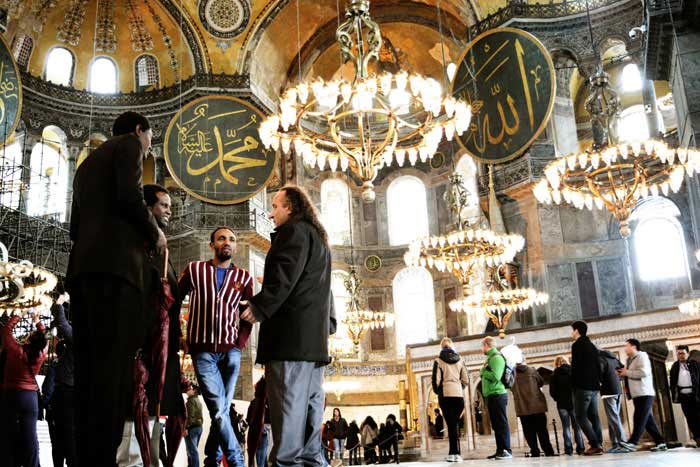The hard men of Justinian’s circle in Constantinople carried with them who knows what resentments, fears, and insecurities from their Balkan homes. These were the men who fled to the safety of the big city, and they could not understand or accept such progress. Instead, they needed to belittle and misread the past, in order to change their present. How better to end the Roman story than with a Romulus, one you could nickname Augustulus? Never mind that there was another western emperor (Julius Nepos) whom Constantinople recognized, and who was still in business as late as 480. Neither historical nor legal accuracy was the point for Marcellinus. Justinian lived, from his earliest days in the palace, in a delusion his own courtiers made for him, a former glory that they clearly imagined, but that had never truly been what they said it was. The past these men created was not real, but a screen on which to vividly project their anxieties from the present.
That is how Justinian came onto the stage. He was a man of limited talents from the provinces, surrounded by gifted men who knew only too well how to reshape their world in the image of delusion about the position of the city and its emperors in this world, about its past, and by implication about its future. We may choose to call them Justinian’s best and brightest or, if you prefer, his neoconservatives.
THE BIRTH OF THE CHRISTIAN ROMAN EMPIRE
This may seem an odd place in our story to speak of the “birth” of the Christian Roman empire. Christianity had long since triumphed, as everyone knows, and Constantine, saint to the Orthodox church, had founded the Christian empire customized guided tour.
But what everyone knows is rarely true. We have seen Constantine and his successors become (mostly) Christians themselves, and we have seen them tilt the advantages of empire in favor of their new creed. Theodosius’s ban on traditional religious practices, coupled with the (intermittent) partisanship of emperors in controversies over creed and doctrine, was a dramatic departure from the past, but his interventions still left most of the empire and most of its citizens well enough alone.
As late as Anastasius and even Justin, and certainly in Theoderic’s realm, Christianity was the religion of empire in the way traditional practices had been. Not so for Justinian. This son of Balkan peasants sought not only the restoration of Roman glory, but also the perfection of Christian unity. In his pursuit of those twin goals, but unaccompanied by either good judgment or good luck, Justinian managed to ensure that neither would ever be attained. A sad thing it is, to come from a distant province and achieve the heights of power, to devote yourself to such lofty principles and marmoreal ostentation, and to discover that zeal and stupidity are not enough. He was not the last ruler of a mighty realm to be so purblind.
Divergent Christianities
Justinian reacted to the multitude of divergent Christianities in his world as though they were so abnormal as to justify and even require a forceful solution. In so doing he took up again the most ancient and perversely appealing of Christian doctrines: that there must be a single form of Christianity throughout the world, which was resolutely far from unified in any other way. As Christian factions defined their respective doctrines with greater and greater clarity, it was inevitable that different modes of belief would congeal in different regions. But Justinian and the unworldly men around him could never accept this.
They also forgot that their capital city itself was an unnatural place Romulus in 753 BC.
In establishing his seat on the Bosporus, Constantine created a third focus of power in the Roman world. If Rome, Carthage, and Ravenna made a natural enough axis for western power, and if Antioch and Alexandria made another axis in the eastern lands, Constantine’s intrusion was unwelcome and unnecessary. Left to their own devices, the Latin west and the Syrian and Egyptian east would doubtless have gone separate ways far ear-lier and far more easily and naturally. But a Mediterranean-wide empire, artificial and fragile though it was, had long since been taken for granted as normal, and so Constantine and his successors could successfully claim that great power emanated from a location halfway between the two main centers of economic and social power whose union created Rome.







